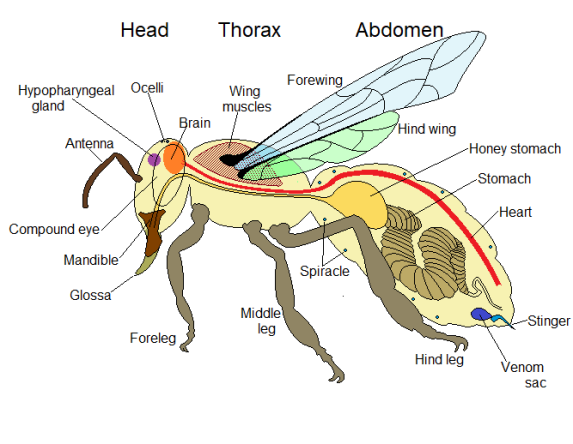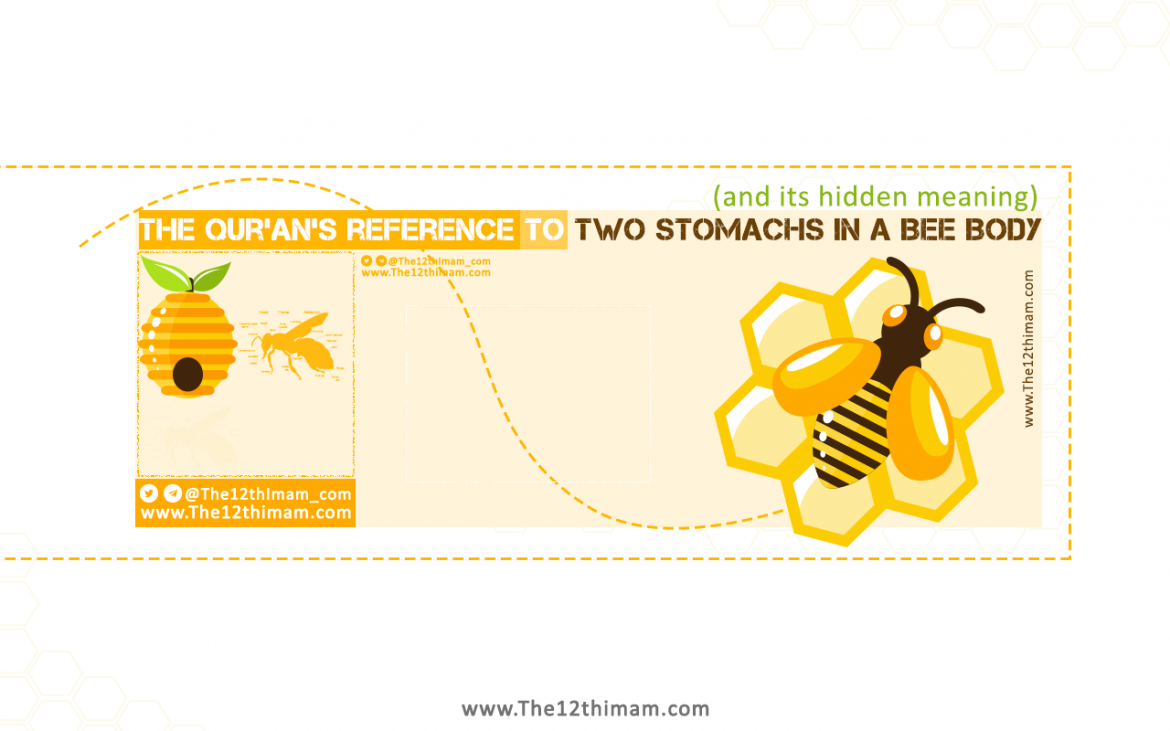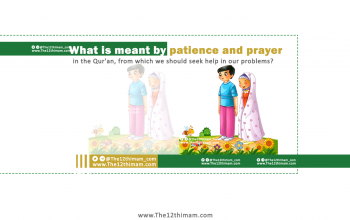Here, we want to mention the scientific reference of the Qur’an to the fact that bees have two stomachs in a time, when animal anatomy (the science of studying structure of animals) was not taught.
Today, it is proven that bees have two stomachs, one for food and water and the other for storing nectar and honey known as honey stomach.
One of the stomachs is used to digest nectar of flowers and foods, and the other special stomach is used to store nectar and turn it into honey.
This is while the Qur’an mentioned this fact 1400 years ago.
The Qur’an states in verse 69 of Surah An-Nahl:
“Then eat from every [kind of] fruit and follow meekly the ways of your Lord. There issues from its bellies a juice of diverse hues in which there is a cure for the people. There is indeed a sign in that for a people who reflect.” (69)
If you pay attention to the word “butun” (meaning “bellies”) used in the above verse, you can see it is a plural noun (irregular plural in Arabic), and such a form donates two or more. That is, the Qur’an has referred to more than one stomach in a bee body in a time, when there was no knowledge of anatomy or biology. Importantly, the word “ha”, which is connected to the word “butun” is a singular feminine pronoun, which implies that the Qur’an refers to more than one stomach in just one bee.
Today, researchers and scientists using modern facilities and technology have proven this issue!
For example, the University of Wisconsin in Milwaukee wrote in a publication in 2017:
“Honey bees have in common… two stomachs – one solely for nectar storage.”

In the above, we mentioned the scientific reference in the Qur’an proven by scientists today, in which God(Allah) invites us to think, after referring to the fact that bees have more than one stomach; that is, thinking in two levels of the appearance and heart of the verse.
The appearance of the verse was presented in the above, but here we deal with the issue for thinking over its heart:
It may be interesting to know that one of the creatures that a believer has been likened to is a bee.
As it is narrated from the Messenger of God (s), who said:
«الْمُؤْمِنُ كَالنَّحْلَةِ«
“A believer is like a bee.”
But, regarding the reasons why a believer is likened to a bee, significant hadiths have been mentioned. As it is narrated from the Messenger of God (s), who said:
«اِنَّ مَثَلَ الْمُؤْمِنِ کَمَثَلِ النَّحْلَةِ اِنْ صَاحَبْتَهُ نَفَعَکَ وَ اِنْ شَاوَرْتَهُ نَفَعَکَ وَ اِنْ جَالَسْتَهُ نَفَعَکَ وَ کُلُّ شَأْنِهِ مَنَافِعُ وَ کَذَلِکَ النَّحْلَةُ کُلُّ شَأْنِهَا مَنَافِعُ«
“A believer is like a bee; If you are with him, he will benefit you, if you consult with him, he will benefit you, and if you accompany him, he will benefit you, and all his actions are beneficial like a bee that all its acts are beneficial.”
It is also narrated from the Prophet (s), who said:
«الْمُؤْمِنُ کَالنَّحْلَةِ تَأْکُلُ طَیِّباً وَ تَضَعُ طَیِّباً وَقَعَتْ فَلَمْ تَکْسِرْ وَ لَمْ تَفْسُدْ«
“A believer is like a bee; he eats pure things and gives pure things, and he sits (bee sits on plants or beehive), while he neither breaks nor spoils [anything].”
It is also narrated from Amir al-Mu’minin Ali ibn Abi Talib (a), who said to his Shiites:
«کُونُوا فِی النَّاسِ کَالنَّحْلَةِ فِی الطَّیْرِ لَیْسَ شَیْءٌ مِنَ الطَّیْرِ إِلَّا وَ هُوَ یَسْتَضْعِفُهَا وَ لَوْ یَعْلَمُونَ مَا فِی أَجْوَافِهَا مِنَ الْبَرَکَةِ لَمْ یَفْعَلُوا ذَلِکَ بِهَا«
“Be among people like a bee among birds; There is no bird unless it considers a bee weak, whereas if they knew what a blessing lies within it, they would never treat it that way.”
(Perhaps they consider it weak, because it does not seek fight against birds and domination over them, but, it has an essence like wilaya of the fourteen infallibles (as) that leads to salvation in the Hereafter).
It is also narrated from the Messenger of God (s), who said to his Shiites:
«شیعَتُنَا بِمَنزِلَهِ النَّحلِ لَو یَعلَمُ النَّاسَ مَا فِی اَجوَافِهَا لَأَکَلُوهَا«
“Our Shiites are like bees and if people would know what they have in their hearts, they would eat them.”
Therefore, some of the similarities between a believer and a bee can be mentioned as following:
1. Benefiting others.
2. Not bothering others.
3. Not harming others.
4. Eating pure foods.
5. Humbleness.
6. Discipline.
7. Organizational work (group work, cooperation).
8. Associating with friends.
9. Benefiting from valuable, pure and clean resources.
10. Trying not to be a mere consumer.
11. Connecting between nectar and honey
12. Patience and perseverance.
13. Necessity of leadership position in the organization
However, just as bees have a queen as leader, believers like bees must have a leader.
But who is the leader of believers?
In this regard, we mention a hadith from the Prophet of Islam (s), who said:
«یا علی انت یعسوب الدین و انت یعسوب المومنین»
“O Ali, you are the leader of the religion and the leader of believers.”
Ya’sub literally means the leader of bees. Imam Ali (as) is called the leader of religion and believers, because just as a queen bee is the leader of bees, Amir al-Mu’minin (a) is also the leader of believers and religion. And as the bees follow their queen, believers should also follow Imam Ali (a).
Of course, in another hadith, Imam Ali (a) also introduced himself and Imam Mahdi (a) as the leader of religion (Ya’sub al-Din).
However, it is better to mention here a hadith from Sunni resources to prove the successorship and rightfulness of Amir al-Mu’minin Imam Ali (a) for them as well.
Ibn Maghazili, one of the prominent Sunni scholars, has narrated through his chain of transmitters, from the Messenger of God (s), who said:
«يا علي انت سيد المسلمين و امام المتقين و قائد الغر المحجلين و يعسوب المؤمنين»
“O Ali, you are the master of Muslims, Imam of the pious, the prince of the bright-faced and the leader of believers.”
Ibn Maghazili then says: “Abu al-Qasim Ta’i said, ‘I asked Ahmad ibn Yahya about the meaning of Ya’sub’, and he answered, ‘It means a male bee that is the leader of beehive.’”
In this hadith, the Messenger of God (s) has compared Ali ibn Abi Talib (a) to the leader of bees.
From the above, we learn that the Qur’an is a book of guidance for humanity. It both refers to the sciences of the universe, and guides people to Imams, who lead us to the truth and eternal paradise, and it invites us to follow them. It also invites us to do good deeds, benefit people, and eat lawful and pure foods (in its hidden sense, it means knowledge; meaning to learn true knowledge, because knowledge is food of our souls), so that we can be prosperous in the Hereafter.
Sources:
Surah al-Nahl, verse 69
Bihar al-Anwar, vol. 61, p. 238.
Al-Amali, the late Shaykh al-Mufid, p. 131.
Al-Nihaya, Ibn Athir, vol. 5, p. 29.
Turayhi, Majma’ al-Baḥrayn, 1416 AH, vol. 2, p. 121.
Ibn Abi al-Hadid, Sharh Nahj al-Balaghah, 1385 AH, vol. 19, p. 224.
Majlisi, Bihar al-Anwar, 1404 AH, vol. 51, p. 113.
Sunni Sources:
Ghayat al-Maram, p. 618, Hadith 1; and Abu al-Qasim Sulayman al-Tabarani in Nazm Durar Al-Samtayn, p. 114 narrates through his chain of transmitters from Abdullah ibn Hakim Juhani, who said:
“The Messenger of God said, ‘indeed, God, the Exalted, revealed to me three things about Ali at the night of journey that Ali is the master of believers, Imam of the pious and the leader of the bright-faced.”
He also has included in footnote that this hadith is narrated by Abu Na’im in Halyat al-Awliya, vol. 1, p. 67.



